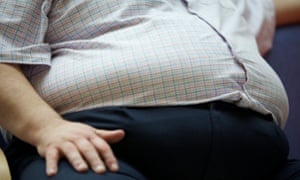Food industry ‘responsibility deal’ has little effect on health, study finds
The coalition government’s policy of tackling obesity by asking food producers to change their behaviour has achieved little, failed to improve eating habits and excludes most of the measures that would make a real impact, a government-funded study has found.
The “responsibility deal”, which ministers claimed would boost public health, has largely involved initiatives that have a limited effect on the problem of poor diets, according to a team of researchers from the London School of Hygiene and Tropical Medicine (LSHTM).
One critic of the policy described the findings as a damning assessment that vindicated public health experts’ fears from the start about it.
In 2012, many food firms, supermarkets and high street chains agreed a series of voluntary pledges with the Department of Health in which they committed to playing their part in trying to ensure that Britons consume 5bn fewer calories a day.
Andrew Lansley, the health secretary at the time, said it was “a great step in the right direction and will help millions of us eat and drink fewer calories”.
But the new research, which is based on examining changes delivered since then by food companies, concludes: “The current nature and formulation of the responsibility deal food pledges is that such pledge implementation is unlikely to have much effect on nutrition-related health in England.”
Researchers led by Cecile Knai, an expert in food and obesity, write in the journal Food Policy that although many firms that have taken part in the deal agreed to make their products healthier, for example by reducing the amount of salt in them, few have done so. “Though reformulation was most commonly listed in the delivery plans, the act of signing up to the RD motivated few organisations to implement such interventions,” they write.
Most of the pledges concerned providing information, raising awareness and communicating with consumers, steps that evidence shows “may have limited effect. It is well-established that interventions which improve information and awareness of health issues or risks do not necessarily translate into positive behavioural change,” the researchers say.
Firms would instead need to pursue other measures to help consumers eat more healthily, but such measures “are currently absent from the RD food pledges”.
For example, a focus on sugar intake is absent from the promises, even though it is increasingly recognised as a major contributor to rising obesity levels and despite “good evidence that an explicit focus by industry members on reducing sugars in processed and pre-packaged foods could have a positive impact on public health.”
In addition, “though RD partners claim that considerable sugar reduction has occurred under their calorie reduction pledge, the current [companies’ own] progress reports do not substantiate these claims”.
The authors point out that the number of calories in products bought by people to eat at home rose by 12% between 2006 and 2014, and sales of sugary foodstuffs rose by 11%. Some firms have made new commitments on sugar reduction since the academics concluded their analysis.
Moves to reduce the marketing of products high in fat, sugar or salt, particularly in packaged or processed foods, were also absent, the researchers say, even though evidence shows they work. Similarly, while pricing changes can also help drive take-up of healthier options and reduce intake of fast food and sugary drinks, participants only mentioned them in relation to a pledge to increase fruit and vegetable consumption.
In all, 37% of the 312 changes participant firms said they would make to tackle obesity would have happened anyway, and 63% were either potentially or probably motivated by the deal, the researchers found.
Knai and all but one of her seven co-authors work for the policy innovation research unit at the LSHTM, an independent unit funded by the Department of Health’s policy research programme to analyse whether new policy approaches result in the expected benefits.
Malcolm Clark, coordinator of the Children’s Food Campaign, said: “This damning assessment of the current responsibility deal cuts through the Department of Health’s spin and shows up the initiative for what it is: more about positive PR for companies than effective, evidence-based new interventions to improve our diets.”
He said the deal was flawed from the start because firms were allowed to decide what pledges they signed up to and there were no penalties for those who did not honour their promises or take part at all.
The food industry rejected the criticism. Barbara Gallani, director of regulation, science and health at the Food and Drink Federation, said the responsibility deal was “the most ambitious and inclusive framework for voluntary action on public health the UK has ever seen”.
She said food and drink producers had helped to develop “a stretching, targeted programme of work. FDF members are proud of the commitment they’ve shown to improving the health of their customers, employees and the people in their communities”, she added, citing some firms’ reduction of sugar in their products as proof that it was working.
Simon Capewell, professor of clinical epidemiology at Liverpool University, said ministers should have used regulation and taxation to combat obesity. “The very idea that industries whose profits rely on unhealthy products would voluntarily do anything to cut sales is like expecting turkeys to vote for Christmas. We and our families will pay the price in terms of disability and death for the coalition government pursuing the responsibility deal and shunning more effective policies.”
The Department of Health said: “The responsibility deal is making a big difference and helping people make healthier choices. The industry is making good progress in reducing calories, salt and sugar in food and drink. Successes include removing a billion units of alcohol over two years, removing billions of calories from soft drinks and food, and cutting adult intakes of salt by 15%.”
[“source-theguardian.com”]

